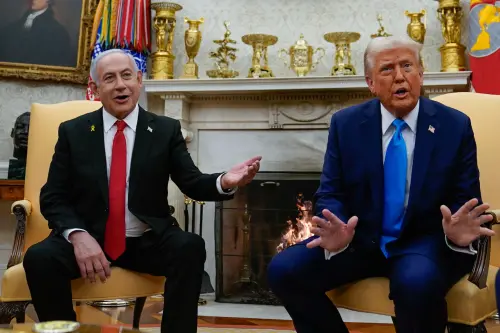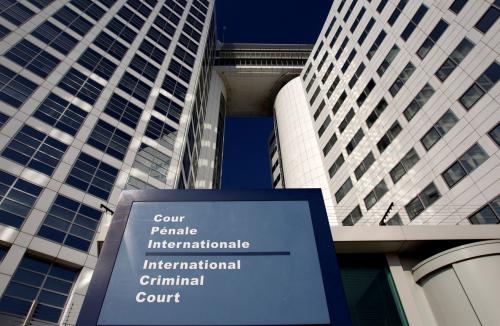Among those watching the U.S. midterms closely to assess the fallout will be Israeli policymakers, writes Shalom Lipner. This piece originally appeared in Haaretz.
 November 6 is report card day for the U.S. government. The results of the hotly contested midterm elections will speak volumes to the Trump administration’s prospects moving forward. Many millions of dollars are pouring into the coffers of both major parties for precisely that reason—to either promote or obstruct the president’s agenda for the remainder of his term.
November 6 is report card day for the U.S. government. The results of the hotly contested midterm elections will speak volumes to the Trump administration’s prospects moving forward. Many millions of dollars are pouring into the coffers of both major parties for precisely that reason—to either promote or obstruct the president’s agenda for the remainder of his term.
Republicans and Democrats assert equally that their faithful were fired-up by Brett Kavanaugh’s bitter confirmation process for the Supreme Court, but indications are that Donald Trump‘s GOP will take a hit. The party controlling the White House traditionally loses seats in the midterm ballot and, indeed, polls are forecasting a Democratic takeover of Congress; Republicans are expected to retain their hold on the Senate.
Among those watching closely to assess the fallout will be Israeli policymakers. Prominent friends of the Jewish state are heavily invested in the campaign—on both sides of the aisle—and relations between Israel and its chief benefactor and ally stand to be impacted by the outcome.
This is the time to consider how Trump has fared in Israel’s backyard over the past two years and, on the cusp of a transformed reality in Washington, how things could now change.
Back in 2016, expounding on his foreign policy views after securing the Republican nomination for president, Trump declared that the U.S. “need[s] unpredictability.” It’s since become a defining feature of his tenure.
On Twitter, he’s trashed foundational treaties of American diplomacy, such as NATO and NAFTA. In September, he confided to thousands at a political rally that he and North Korean dictator Kim Jong-un “fell in love.” Trump has reveled in playing the enfant terrible who breaks all the china, pun intended.
His pursuit of “better deals” for America has antagonized many of its friends, but it has not been bereft of success. Along the way, Benjamin Netanyahu’s government has also been an ostensible beneficiary of the Trump approach. (It’s no coincidence that 69 percent of Israelis—the second highest proportion in the world – expressed confidence recently that Trump would “do the right thing regarding world affairs.”)
After eight years—minus ten weeks—of incessant sparring between Netanyahu and Barack Obama at the helm of the U.S.-Israel relationship, those tensions have largely subsided, and the two executive branches are marching in relative lockstep.
On Iran, Netanyahu’s signature issue, Trump’s May 2018 withdrawal from the JCPOA nuclear deal was much to the chagrin of its other participants—but still generated their begrudging conformity with a tighter sanctions regime.
Bucking conventional wisdom, Trump also blazed a trail with a series of decisions favoring Israel’s positions in its conflict with the Palestinians.
A presidential proclamation recognized Jerusalem as the capital of Israel and mandated the relocation of the U.S. embassy to the city. The State Department announced a cessation of funding for UNRWA, the agency providing aid for the Palestinians and reviled by the Israeli government for perpetuating their refugee status.
For good measure, Trump also pulled the U.S. out of the U.N. Human Rights Council, where Israel is the punching bag of choice.
On the other hand, the administration’s penchant for pyrotechnics—deployed mostly against lower hanging fruit—has been coupled with a reluctance to engage deeply with “messier” strategic questions. Here, the negative consequences for Israel are more acute.
Trump’s deference to Vladimir Putin has, among other things, conceded the run of the Syrian theater to Moscow and its nefarious proxies, including Iran and Hizbollah. An ascendant Russia in the regional driver’s seat has complicated Israel’s operational calculus immensely.
Trump has shown himself to be fond of grand symbolic gestures and ceremonious flashes of his official pen, but he has yet to visit his own troops stationed in Iraq, Syria, or Afghanistan.
If, on balance, Trump has been sympathetic to Israeli concerns—his evident tolerance for white supremacists, notwithstanding—the greatest danger for Israel is the tentativeness of these gains. Who can be certain that Trump, who regularly chastises his country’s closest partners, will not flip the table over on Israel’s head too? Even the best partnerships can be fragile.
The architecture of Israel’s Middle East posture is shifting at this very moment. A potential thaw in Trump’s relations with Turkey’s President Erdogan could put unfriendly Ankara back in America’s good graces. Meanwhile, fallout from the death of journalist Jamal Khashoggi at the hands of Saudi interrogators is all but guaranteed to drive a wedge between Washington and Riyadh—perhaps turning hopeful Israeli-Saudi cooperation into a liability.
This volatility is Israel’s Achilles’ heel.
Frequent turnover among the ranks of senior administration officials has not only encumbered coordination with Israel (and others), but also seen the departure of treasured allies such as departing U.N. Ambassador Nikki Haley. This turnstile will be working overtime during midterm season, and the newcomers may be even less capable of restraining Trump’s darker impulses.
Further ahead, approaching the 2020 vote and beyond, Israel will surely remain a political football in an increasingly polarized America. Pushing back against a recent New York Times story alleging that their party’s attachment to Israel has become tenuous, Democratic lawmakers reaffirmed their historic support for Israel. But their resentment toward the Trump White House—and, by extension, its Middle East policy—is no less powerful.
Netanyahu has taken out a big mortgage in embracing Trump. Detractors of the current administration, including a preponderance of American Jews, may not be inclined to forget and forgive the fact that Israel has been one of this president’s loudest cheerleaders.
The challenge for Israel will be to safeguard the benefits of this high-stakes gamble as Trump’s rivals are poised to curb his power and angling, down the road, to replace him in office.
The Brookings Institution is committed to quality, independence, and impact.
We are supported by a diverse array of funders. In line with our values and policies, each Brookings publication represents the sole views of its author(s).







Commentary
After the midterms, could a threatened, volatile Trump flip on Israel?
October 24, 2018